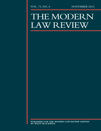Post-Secularism & the European Court of Human Rights: Or How God Never Really Went Away

Post-Secularism & the European Court of Human Rights: Or How God Never Really Went Away
Ian Leigh and Rex Adhar
The Modern Law Review 75:6, 1064-1098
Wylie Online Library 1 Nov 2012
This article analyses the critical yet elusive notions of state neutrality, secularism and religious coercion under the European Convention in light of the European Court of Human Rights recent decision in Lautsi v Italy. We contend that the real concern in the Italian crucifix case was not the infringement of the school pupils’ religious freedom nor the proselytising or coercive effect of the ‘passive’ religious symbols. Rather, opponents of the longstanding symbols were animated by desire for strict religious equality, a notion that is, correctly in our view, not guaranteed under the Convention. Lautsi has significantly cleared the conceptual undergrowth surrounding state neutrality and the varieties of secularism, reined in the elastic notion of religious coercion and eschewed attempts to squeeze the constitutional diversity of European religion-state frameworks into a strict American-style separationist mould. The Convention jurisprudence on freedom of religion has finally come of age.